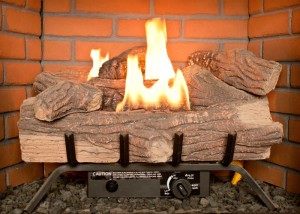At Blue Ridge Chimney Services, one of the questions we are asked the most often is: “What are the benefits of a gas fireplace compared with a wood-burning fireplace?” These two types of fuels both have their advantages and disadvantages, but unless you desire the atmosphere of a crackling wood fire, we feel the benefits of gas fireplaces outweigh those of wood-burning units. We would like to share these benefits with you to show you why we feel so strongly about them.
Gas fireplaces are much easier to use
The convenience factor of starting a fire by pushing a button convinces many people to choose gas fuel over firewood. Even more convenient is being able to operate your fireplace with a remote control, which allows you to turn the flame up or down from your couch. With a wood-burning fireplace, you have to go outside to get firewood from storage. Once you have brought your wood inside, you then have to arrange it in a certain way, find some kindling, and then you can start the fire. Maintaining a wood-burning fire takes some effort as well because to keep the flame roaring, you have to add more wood to the fire. A gas fireplace gives you instant heat gratification with zero effort.
No cleanup required
You do not have to clean anything up after a fire in a gas-fueled unit. When your wood-burning fire is extinguished, a lot of soot and ash residue are left behind for you to clean up by sweeping after every fire. With a gas fireplace, you will have no sweeping chores after a fire, and you will never have to worry about removing and disposing of ashes from the firebox. Your chimney will also be cleaner with a gas fireplace as you do not have to worry about creosote deposits accumulating on your chimney’s walls. Creosote is a highly combustible by-product of wood smoke, and large deposits of creosote can cause chimney fires if your chimney is not professionally swept. However, even though you do not need to be concerned with creosote removal, the Chimney Safety Institute of America (CSIA) recommends you still need to schedule an annual chimney sweeping and inspection to be sure your venting system is working properly and to prevent drafting problems.
Higher efficiency ratings and lower emissions
If you are environmentally-conscious, a gas fireplace has higher efficiency ratings and lower emissions.Much cleaner burning than a traditional wood-fueled fireplace, a gas unit releases 98% less pollution into the air than its wood-burning counterpart. The United States Environmental Protection Agency gives gas fireplaces higher efficiency ratings over wood-burning ones for their ability to produce a comfortable amount of heat from a flame without adding a lot of pollutants to the atmosphere.
Economical source of heat for your home
Gas fireplaces are an economical source of heat for your home. While the cost of natural gas does fluctuate, it is still a less expensive fuel source for heating your home than electricity. Of course, if you cut your own firewood, a wood-burning fireplace can be operated free of cost. However, few take the time to cut wood and have to buy firewood, which can also range in price.
If you would like to talk about these and more advantages of a gas fireplace, contact Blue Ridge Chimney Services today. We can help you compare these fireplaces to wood-burning units by discussing even more benefits.

